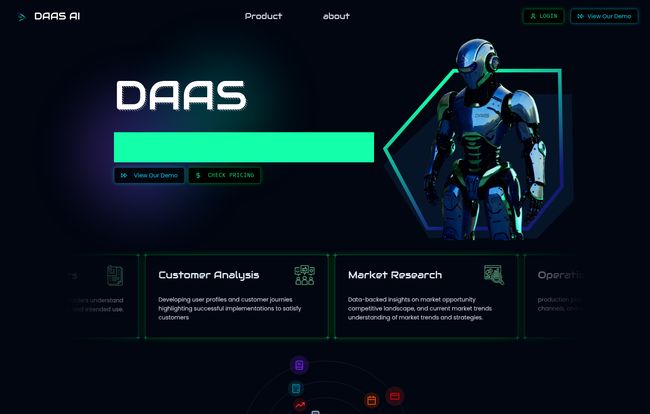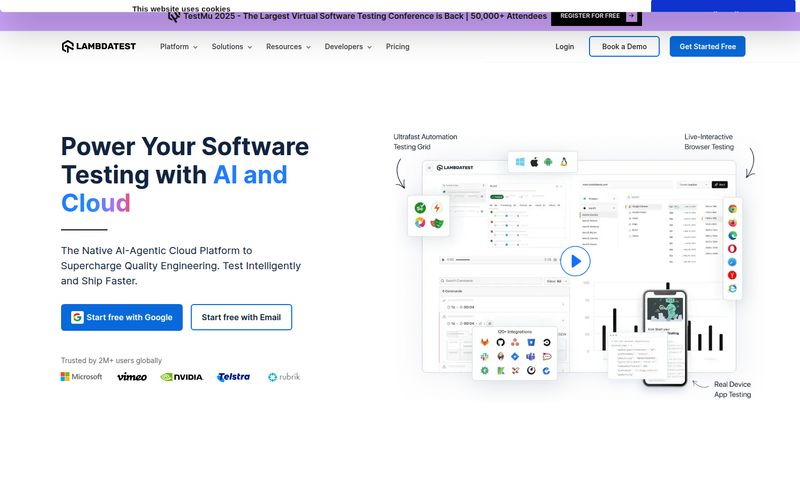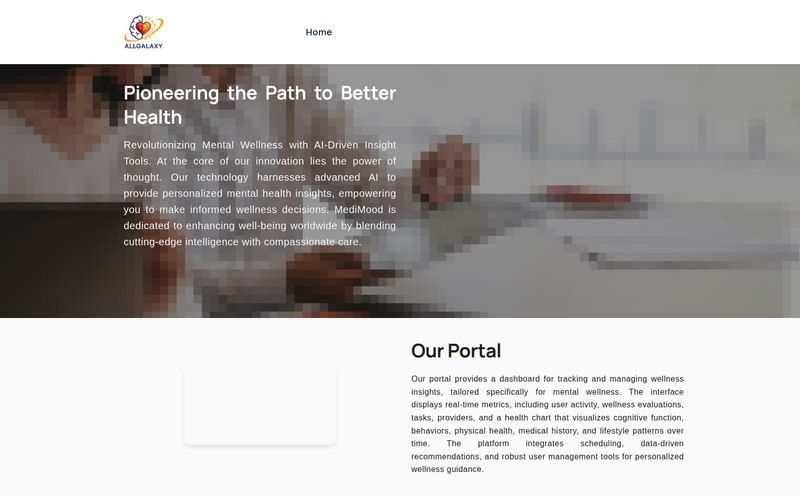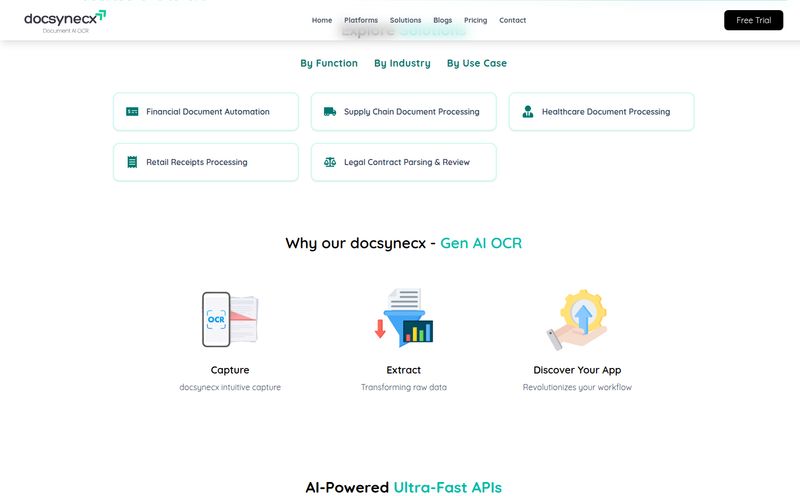Running a startup is organized chaos. You’re the CEO, the head of marketing, the janitor, and the person who has to untangle the printer cable. It’s a grind. And deep down, in those 2 AM moments fueled by questionable coffee, we’ve all wished for a co-founder. Not just any co-founder, but the perfect one. The one who loves spreadsheets, who can whip up a financial forecast in their sleep, and who actually enjoys market research. You know, the boring stuff.
Well, the tech world, in its infinite wisdom, thinks it has an answer: an AI co-founder. The latest contender making this bold claim is a platform called DAAS. The name itself sounds like something out of a sci-fi movie, and looking at their website, with its sleek dark mode and futuristic mech warrior mascot, they’re definately leaning into that vibe.
As someone who’s been swimming in the SEO and digital strategy waters for years, I've seen a zillion tools promise to “revolutionize” business. Most are just fancy chrome extensions. But the idea of an AI-powered brain trust for a startup... that got my attention. So, I put on my critic’s hat, pushed aside my natural skepticism, and decided to see if DAAS is just another piece of shiny vaporware or if it’s genuinely the helping hand founders are so desperate for.
So, What Exactly Is This DAAS Thing?
At its core, DAAS bills itself as an AI-powered SaaS (Software as a Service) platform built specifically for startups. The big, flashy promise is that it acts as your “virtual co-founder.” Forget just being a tool; it aims to be a strategic partner. It’s designed to handle the heavy lifting of business operations and financial planning, freeing up the human founders to, you know, actually build the product and talk to customers.
It’s not just one thing. It’s a suite of tools that covers a shocking amount of ground: from financial modeling and valuation tracking to creating your entire business plan and the pitch deck you'll use to beg for money. It's an ambitious concept, trying to bundle the job of a CFO, a business analyst, and a strategist into one dashboard.

Visit DAAS AI
The 'Before and After' Picture DAAS Loves to Paint
Every great product solves a problem, and DAAS is very clear about the chaos it wants to fix. They present this stark contrast between the old way and their new way.
The “Before DAAS” world is one we all know too well. It’s a messy Google Drive folder filled with 17 versions of “Financials_Final_v3_USE_THIS_ONE.xlsx”. It’s basing a huge decision on a gut feeling because your customer data is in one place, your market research is in another, and neither has been updated since last quarter. They call it:
- Traditional planning
- Isolated data
- Segmented processes
- Limited scalability
It’s a polite way of saying “a complete mess.” And they’re not wrong. This is the default state for 90% of early-stage companies. Then, they show you the promised land, the “With DAAS” world, which is all about dynamic forecasting, integrated analytics, and strategic agility. It sounds like corporate bingo, but the idea behind it is powerful: a single source of truth where everything connects. Your customer trends inform your financial models, which in turn help shape your pitch deck. It’s a beautiful, interconnected dream.
Breaking Down The Toolkit: What's Actually Under the Hood?
Okay, enough with the marketing promises. Let’s get into the nitty-gritty. What can this thing actually do? I see its features falling into a few key categories.
The Financial Brain: Goodbye, Spreadsheet Hell
This is the heart of DAAS, in my opinion. The platform offers real-time financial analysis and dynamic modeling. For anyone who has ever tried to build a three-statement financial model from scratch, this is music to your ears. The idea is you input your data, and the AI helps you create projections, run different scenarios (what if we hire 3 developers? what if our customer churn increases by 5%?), and track your company’s valuation over time. This is the kind of stuff that usually requires a full-time finance person or an expensive consultant. Having it on-demand is a big deal.
More Than Just Numbers: Strategy and Market Intel
A business isn’t just a spreadsheet. DAAS seems to get this. It includes tools for customer analysis and market research. The visuals on their site show a kind of mind-map interface, which suggests it helps you visualize your target market, identify customer segments, and map out the competitive landscape. I've always preached that good SEO and marketing are built on a deep understanding of the customer. If this tool can genuinely help founders shortcut that research process with reliable data, that’s a massive win.
The Fundraising Secret Weapon?
Here’s where it gets really interesting for most founders. DAAS has a business plan and pitch deck generator. Let that sink in. It claims to take all your financial and strategic data from the platform and automatically assemble it into a coherent business plan and a compelling pitch deck. This could save hundreds of hours of agonizing over slide design and wording. It also includes Cap Table Management and an Investor Relations Management (IRM) tool, which are critical for managing your equity and keeping investors happy post-funding. It's a full-stack fundraising assistant.
The Good, The Bad, and The AI
No tool is perfect. As much as I’m intrigued by the potential, it’s important to stay grounded. Here’s my breakdown of the good and the not-so-good.
The Advantages
The biggest pro is the sheer integration. Having your financial models, market research, and pitch deck all living in the same ecosystem and feeding off the same data is the holy grail. It prevents the kind of embarrassing moments where the numbers in your appendix don't match the chart on slide 5. For a solo founder or a small team without a dedicated CFO, this could provide some much-needed financial discipline and strategic clarity. It's like having guardrails to keep you from driving your startup into a ditch.
The Reality Check
Okay, let's be real. This isn't magic. The first big hurdle is the classic “garbage in, garbage out” problem. The AI is only as smart as the data you give it. If your initial assumptions are wildly off-base, DAAS will just help you create a very pretty, very detailed plan for failure. You still need human oversight and business acumen to gut-check the outputs. Secondly, there’s likely a learning curve. A powerful tool like this isn't something you master in an afternoon. Founders are already time-poor, so they need to decide if the upfront time investment is worth it. I couldn't find a lot of independent reviews, like on G2 or Capterra, so it's still a bit of an unknown quantity in the wild.
What's the Damage? A Look at DAAS Pricing
This is the million-dollar question, isn't it? Or, hopefully, a few-hundred-dollars-a-month question. Here’s the tricky part: DAAS doesn’t list its pricing publicly. When I went to check their pricing page to give you the scoop... well, it wasn't there (hello, 404 error!).
This isn't uncommon for B2B SaaS tools targeting startups, especially those with a high-touch sales process. It usually means they want to get you on a demo call to show you the value before they hit you with the price tag. I’d speculate it’s a tiered monthly subscription, probably with different levels based on features or team size. My advice? If you’re serious, you’ll just have to book a demo and find out for yourself.
So, Should You Hire This AI Co-Founder?
After digging in, I’m cautiously optimistic. DAAS is not a magic wand that will build your business for you. But it could be an incredibly powerful force multiplier. It’s for the founder who knows what they need to do but gets bogged down in the “how.” It’s for the team that needs to bring a level of professionalism and data-driven rigor to their planning and fundraising efforts.
If you're a later-stage company with a full finance and strategy team, this probably isn't for you. But if you're an early-stage startup, a solo founder, or a small team trying to punch above your weight, DAAS is definately worth a look. It could be the difference between a chaotic start and a strategic one.
Frequently Asked Questions
- What is DAAS in simple terms?
- DAAS is an AI-powered software platform for startups that acts like a 'virtual co-founder.' It helps with financial planning, market research, creating business plans, and generating pitch decks, all in one integrated system.
- Can DAAS completely replace a human CFO?
- In my opinion, no. It's a powerful tool that can handle many tasks of a CFO, especially the modeling and reporting. However, it still requires human strategic oversight, industry knowledge, and critical thinking to ensure the data and assumptions are sound. Think of it as a CFO's best friend, not a replacement.
- Is DAAS suitable for any type of startup?
- It seems best suited for early-stage startups, particularly those in tech or other fields that need to create detailed financial projections and seek venture capital funding. A very small local business or a freelance artist might find it to be overkill.
- How exactly does DAAS help with securing funding?
- It helps in three key ways: by generating data-backed financial models and valuations, by automatically creating professional-looking business plans and pitch decks, and by providing tools to manage investor relations and your cap table once you do get funded.
- Where can I find information on DAAS pricing?
- Currently, DAAS does not list its pricing on its website. To get information on costs, you need to contact their team or book a demo through their official site.
Final Thoughts
The dream of a perfect co-founder might remain just that—a dream. But tools like DAAS are getting us tantalizingly close to automating the most painful parts of that job description. It won't make the tough decisions for you, but it just might give you the clarity and the data you need to make the right ones. And for any founder, that’s worth its weight in gold.
Reference and Sources
DAAS Official Website: https://daas.ai/
G2 - Startup Business Plan Software Category: https://www.g2.com/categories/business-plan



